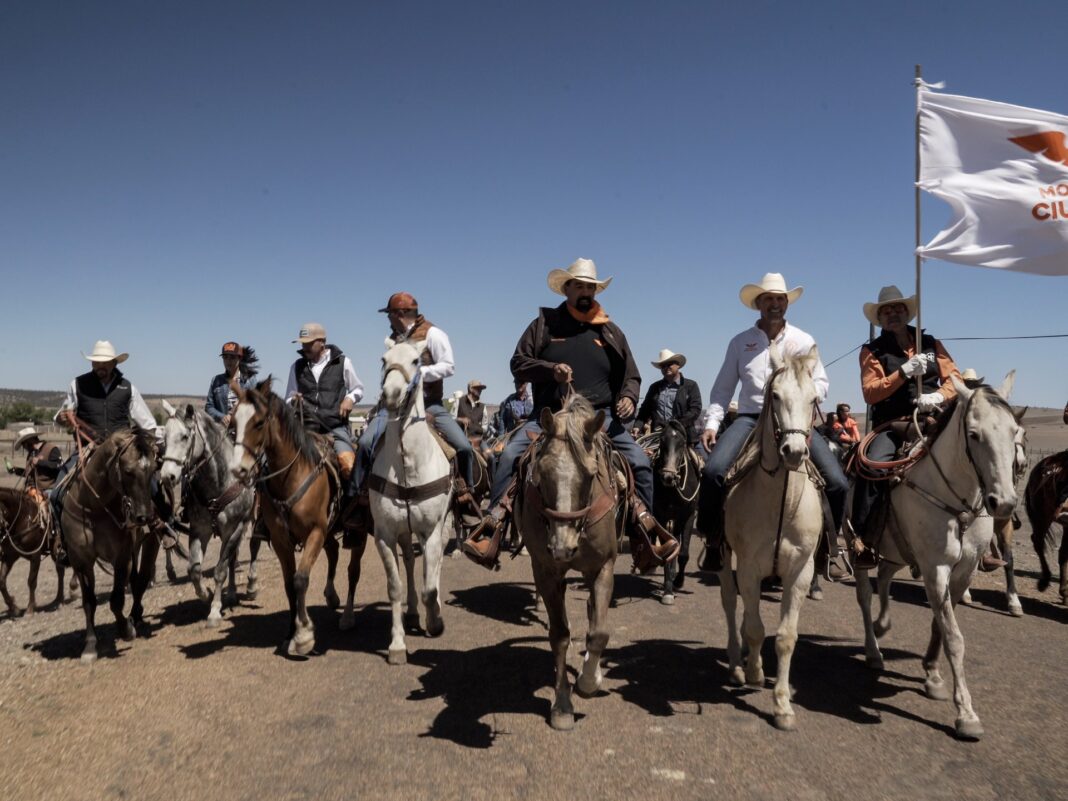When LeBaron was first allocated a security team, he was reluctant. He refused to even let Ayala drive. “I underestimated him,” he said.
Nowadays, though, LeBaron admits he leans on his security team. Agent Ayala is never far away, watching for danger.
Ayala explained that the only time the security team stands down is when LeBaron campaigns in remote areas where the presence of the National Guard would likely cause a confrontation with local cartels.
Not all the safety threats come from organised crime, though. During one event, LeBaron and 700 others rode on horseback into a town, and Ayala’s quick reactions prevented a thick tree branch from falling on Johnson Berlin, LeBaron’s wife.
Wearing a short-sleeved, immaculately ironed shirt, Ayala explained that his job is to be flexible, facilitating but not impeding the candidate’s campaign. That means plans are made — and altered — on the fly.
“Running security on the campaign trail differs from normal VIP protection,” Ayala said.
“Everything changes. We have to be ready at all times without the luxury of planning primary, secondary and tertiary routes that come with standard diplomatic protection.”
Ayala points out that many high-level politicians have tightly wrought schedules to structure their day, organised with the help of a large staff. Protecting candidates like LeBaron, however, requires more fluidity.
The protection teams aren’t always successful, though. On the final day of campaigning, Jose Alfredo Cabrera, a candidate in Guerrero, was assassinated despite having a National Guard security team.
Ayala blamed new protocols for creating security weaknesses. He said they require the National Guard agents to be in uniform and stand at a distance from the candidates.
The new rules “do not respect the usual bodyguard protocols that require you to be as close to the principal as possible at all times”, he explained.
Ayala also underscored the need to adapt when on the road with candidates, something he feels the new rules do not accommodate.
“When there is no agenda, you have to do everything in the moment. Usual protocols, such as not driving at night, no longer apply,” he said.
Ayala’s ability to adapt was tested one last time when LeBaron left the final rally of his campaign at 11pm in Matachi, an area known to be particularly dangerous.
During the course of the event, Ayala had received intelligence that armed men, in about 20 vehicles, were patrolling the surrounding streets.
The two-hour drive back to LeBaron’s home was going to be dangerous. Time was of the essence: every second in the open was a second in danger.
Previously, LeBaron had always insisted on breaking protocol to sit in the front, but now, he followed the agent’s instructions to sit in the back with his wife. Two National Guard trucks sandwiched the candidate’s vehicle.
As they drove, Johnson Berlin noticed a truck behaving erratically behind them, its headlights flashing through their rear window. Fear flickered across her eyes as the truck repeatedly tried to overtake the speeding convoy.
On high alert, the National Guard agents aimed their weapons at the truck, the green lasers of their firearms bouncing over the vehicle as it finally passed the convoy and disappeared into the night.
Ayala, LeBaron and the convoy continued to fly across the country roads, with Ayala hugging the lead vehicle, never more than a few feet away. They sped through red lights, hitting speeds of 180 kilometres per hour (120 miles per hour).
But then the chase came to a sudden stop. They needed petrol.
“We’re in the middle of what feels like a high-speed chase when we have to stop for half an hour to get fuel. It’s super inefficient and dangerous,” LeBaron would later remark, having finally made it back to the relative safety of his home.
But the campaign was finally over. There was nothing more for him to do other than wait for the outcome of Sunday’s election — and see where life would take him next.







